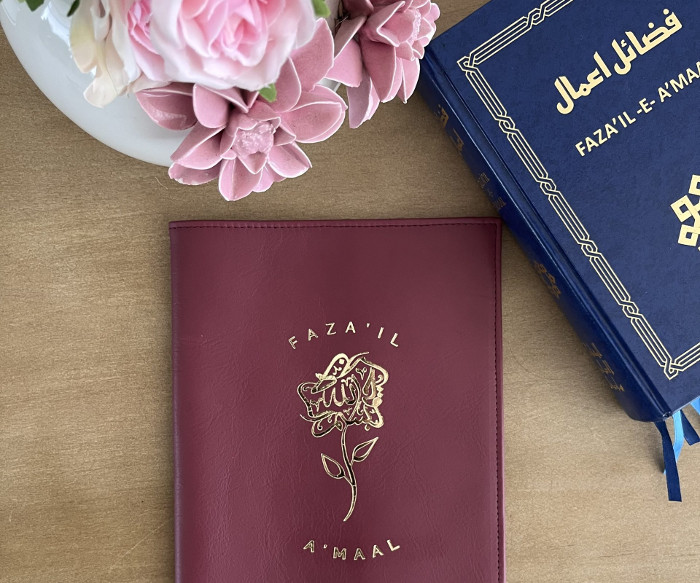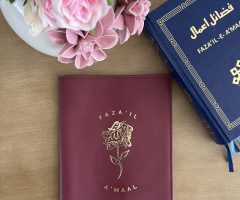
Rasulullah’s (sallallahu ‘alaihi wasallam) Life of Abstinence
On one occasion, Rasulullah (sallallahu ‘alaihi wasallam) had taken an oath that he would not live with his wives for one month in order to correct them for some mistake they had made. For that one month, he lived in a separate room which was upstairs in his house.
A rumour began spreading among the Sahaabah (radhiyallahu ‘anhum) that Nabi (sallallahu ‘alaihi wasallam) had divorced his wives. At that time, Hazrat Umar (radhiyallahu ‘anhu) was in his home. On hearing the news, he came running to the Musjid and found the Sahaabah (radhiyallahu ‘anhum) sitting separately. They were all in tears because of Rasulullah’s (sallallahu ‘alaihi wasallam) displeasure and suffering. Rasulullah’s (sallallahu ‘alaihi wasallam) wives were all weeping in their homes.
Hazrat Umar (radhiyallahu ‘anhu) went to his daughter, Hazrat Hafsah (radhiyallahu ‘anha), the wife of Nabi (sallallahu ‘alaihi wasallam), and found her weeping in her room. He said to her, “Why are you weeping now? Have I not warned you before not to do anything that will make Nabi (sallallahu ‘alaihi wasallam) angry?”
He returned to the Musjid and found some of the Sahaabah (radhiyallahu ‘anhum) weeping near the mimbar (pulpit). He sat there for some time, but due to grief, he could not remain seated, but got up and proceeded towards the room where Nabi (sallallahu ‘alaihi wasallam) was staying.
There he found the slave, Hazrat Rabaah (radhiyallahu ‘anhu), sitting on the steps leading to the room. Hazrat Umar (radhiyallahu ‘anhu) asked him to enquire if Nabi (sallallahu ‘alaihi wasallam) would permit him to enter the room. Hazrat Rabaah (radhiyallahu ‘anhu) went inside and sought permission for Hazrat Umar (radhiyallahu ‘anhu), but Rasulullah (sallallahu ‘alaihi wasallam) remained silent. He then returned to Hazrat Umar (radhiyallahu ‘anhu) and informed him that Nabi (sallallahu ‘alaihi wasallam) had remained silent and did not say anything. In a state of sadness, Hazrat Umar (radhiyallahu ‘anhu) returned to the Musjid and sat near the mimbar.
After a little while, he again got up and requested Hazrat Rabaah (radhiyallahu ‘anhu) to seek permission on his behalf. This time again, Nabi (sallallahu ‘alaihi wasallam) gave no reply and Hazrat Umar (radhiyallahu ‘anhu) returned to the Musjid. When this happened for a third time, Rasulullah (sallallahu ‘alaihi wasallam) finally permitted him in.
As Hazrat Umar (radhiyallahu ‘anhu) entered the room, he saw Nabi (sallallahu ‘alaihi wasallam) lying on a woven mat made from palm-leaves which had no covering (sheet) spread on it. As a result, the imprint of the fibres of the mat could easily be seen on his mubaarak body, as imprints will become more visible on the body of a person who is fair and handsome. There was also a leather bag filled with the fibre of the date palm which Nabi (sallallahu ‘alaihi wasallam) used as a pillow.
Hazrat Umar (radhiyallahu ‘anhu) says:
I greeted him with salaam, and the first thing I asked him was, “O Nabi of Allah Ta‘ala, have you divorced your wives?” He answered that he had not done so. Hearing this, I addressed Rasulullah (sallallahu ‘alaihi wasallam) in a light-hearted way saying, “O Nabi of Allah! We, the Quraish, remained dominant over our women, but on coming to Madinah, we have seen that the women of the Ansaar dominate their menfolk. It seems that the women of the Quraish, after coming here to Madinah Munawwarah, have become influenced by the way of the women living here.”
I said a few more things which made him smile. I noticed that all that lay in his room were three pieces of untanned hides (animal skins) and a handful of barley lying in a corner. I looked about, but I could not find anything else. I therefore began to weep.
Rasulullah (sallallahu ‘alaihi wasallam) asked, “Why are you weeping?” I replied, “O Nabi of Allah! Why should I not weep? I can see the imprint of the woven date-palm mat left on your body, and that all you possess is only what I see in this room. O Nabi of Allah! Make dua that Allah Ta‘ala grants your ummah ample wealth and provisions. The Romans and Persians, despite not following the correct deen and not worshipping Allah Ta‘ala, they enjoy such abundance of wealth that (their leaders) Caesar and Chosroes, live in gardens with streams flowing in between. You being the Rasul and special selected servant of Allah Ta‘ala, yet you are living in such a condition (of poverty)!”
Nabi (sallallahu ‘alaihi wasallam) was resting against his pillow, but when he heard me talk like this, he sat up and said, “O Umar! Are you still in doubt about this matter? Ease and comfort in the Aakhirah are much better than ease and comfort in this world. The kuffaar are enjoying their share of the good things in this very world, whereas we have all wonderful things waiting for us in the next.” I begged him saying, “O Nabi of Allah! Seek Allah Ta‘ala’s forgiveness for me! I was really in the wrong!”
This was the lifestyle of Rasulullah (sallallahu ‘alaihi wasallam) – the king of this world and the next, and the most beloved servant of Allah Ta‘ala, that he did not even have a covering to spread over his mat, due to which the imprints of the mat were left on his mubaarak body. We have also seen the meagre possessions he had in his home. Yet, when Hazrat Umar (radhiyallahu ‘anhu) saw this condition and asked him to make dua for abundance in wealth, he corrected him.
Once, a person enquired from Hazrat Aishah (radhiyallahu ‘anha) regarding what the bedding of Nabi (sallallahu ‘alaihi wasallam) was made from. She said, “It was just an animal skin filled with the fibre of a date palm.”
When the same question was put to Hazrat Hafsah (radhiyallahu ‘anha), she said, “His bedding was a piece of thick cloth which I double folded under him. Once, I folded it four times to make it softer and more comfortable. The next morning, he asked me, “What did you spread under me last night?” I replied, “The same cloth, but I folded it four times instead of two.” He said, “Keep it as it was before. The extra softness makes it difficult to get up for Tahajjud.”
Let us look at our soft cotton duvets! Despite Allah Ta‘ala giving us so much, instead of being thankful and grateful, we always complain of constraints and difficulties.
(Fazaa’il-e-A’maal [English] pg. 60-62, [Urdu] pg. 44-47)
 Ihyaaud Deen An Effort to Revive Deen in Totality
Ihyaaud Deen An Effort to Revive Deen in Totality



